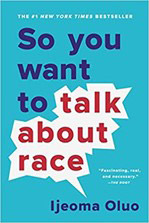Day 4: Talking About Race Is Challenging for Some. Here’s Why.
“Our humanity is worth a little discomfort, it’s actually worth a lot of discomfort.”
Ijeoma Oluo, So You Want to Talk About Race
Have you heard of the term “white fragility?” For white people, “white fragility” refers to their discomfort and avoidance of racially charged stress, which further perpetuates white supremacy culture. It is likely that many Black, Indigenous and people of color are familiar with this concept.
Dr. Robin DiAngelo describes white fragility as a state of being for white people in which even a minimum amount of racial stress becomes intolerable, triggering a range of defensive moves. These moves can include the outward display of emotions such as anger, fear, and guilt, and behaviors such as argumentation, silence, and leaving the stress-inducing situation. These behaviors shut down conversations, and inhibit actions which, in turn, function to reinstate white racial equilibrium.
In the book So You Want to Talk About Race, author Ijeoma Oluo explains “You have to get over the fear of facing the worst in yourself. You should instead fear unexamined racism. Fear the thought that right now, you could be contributing to the oppression of others and you don’t know it. But do not fear those who bring that oppression to light. Do not fear the opportunity to do better.”

https://wearelitgr.com/collections/culture-race-and-politics?page=3
Today’s Challenge

Watch: Watch author Renni Eddo-Lodge explain what happens when she tries to talk about race with white people. (3:26)

Test: Take a quick quiz from the publisher of “White Fragility: Why It’s So Hard for White People to Talk about Racism,” Robin DiAngelo, PhD, to see if you exhibit “White Fragility” traits. Want to dive in further? Read a short article by Dr. DiAngelo that unpacks how we continue to reproduce racist outcomes and live segregated lives.

Listen: Listen to Stateside interview with the Detroit Equity Action Lab about what white people can do about racism in America. The episode starts by asking the question ‘What can white people do about racism in America?’ to people walking around Ann Arbor and Northville. (17:30)

Read: Review this list of 28 common racist attitudes and behaviors that indicate a detour or wrong turn into guilt, denial, or defensiveness.
Discussion
In what ways have you seen white fragility show up for you (guilt, denial, defensiveness)?
How do you see white fragility as being harmful to advancing racial equity and social justice?




















